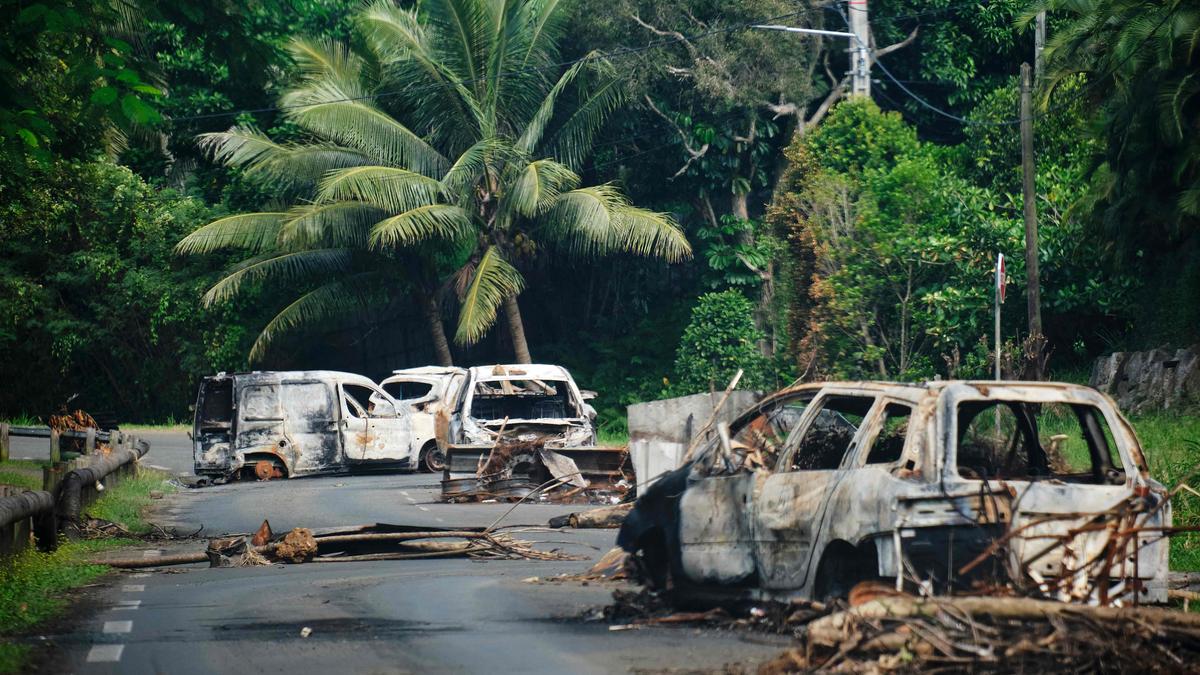
What is happening in the French territory of New Caledonia? | Explained Premium
The Hindu
The Socialist Kanak National Liberation Front (FLNKS) of the south pacific French territory of New Caledonia called for French President Emmanuel Macron to abandon the plan to modify the electoral reform.
The story so far: On June 3, the Socialist Kanak National Liberation Front (FLNKS) of the south pacific French territory of New Caledonia called for French President Emmanuel Macron to abandon the plan to modify the electoral reform.
Widespread protests and riots erupted in New Caledonia in response to the French parliament’s decision to amend the voters’ list. The new amendment bill will pave the way for incorporating citizens who were either born or lived in the territory for at least 10 years. Kanaks, the indigenous community of the territory, opposed this on claims that it diluted their electoral power thus marginalising them. The Kanaks comprise 43% of the 1,45,000 population, while the European (French loyalists), Wallisians and Futunians comprise 37%. The new voting amendment will give majority to the loyalists undermining the Kanaks’ future towards decolonisation. This would also mean an alteration of the internal political environment towards French settlers.
New Caledonia had Kanaks as the original inhabitants. France gained control of the territory in 1853 and governed the Kanaks with reservations. After the Second World War, colonial laws were abolished and the Kanaks were granted French citizenship. In the 1960s, increased migration from France turned the Kanaks into a minority in New Caledonia. Angered by their deteriorating socio-economic status and lack of economic and political involvement, an independence movement grew along with the emergence of the FLNKS in 1984. Thus, tensions soared between the Kanaks and loyalists between from 1984 to 1988 which ended with the signing of the Matignon agreements in 1988 and the Nouméa Accord in 1998 between the Kanaks and the French government. This allowed the transfer of powers from Paris to local authorities along with three referendums to decide the territory’s independence.
The independence referendums held in 2018 and 2020 were in favour of France, and against an independent New Caledonia. Kanaks requested to postpone the third and final referendum due to COVID-19 in 2021, but the French disregarded the request. A lower turnout ensured a 96% result against an independent state. This infuriated the Kanaks who then opposed talks with the French government.
Post World War II, after the granting of French citizenship and transforming the French colonies into overseas territories, New Caledonia’s migration pattern increasingly reflected that, of what the Kanaks call, “settler colonialism.”
Under this new model, social inequalities widened leading to the exploitation of the indigenous community. This was observed in the steel and nickel mining sectors, where indigenous people remained as labour while the non-indigenous people reaped economic and political benefits. And despite France’s promise to reverse social inequalities and better Kanaks’ political participation, the 2019 census showcased the poverty rate among Kanaks to be 32.5%, while only nine per cent of non-Kanaks experienced poverty. The scope of economic progress being stalled and the vote by the French Parliament to alter the electoral composition is seen as a move to end Kanak independence.
First, achieving tactical peace. More violence would mean an increased threat to overseas French citizens and a risk to Mr. Macron’s party’s reputation.

After a long, tiring day all we want is to jump right on our cosy beds and rest comfortably on our soft, fluffy pillows, right? Pillows are not quite appreciated as much as electric cars or air-fryers, for instance. Pillows are a wonderful man-made creation that has improved the lives and sleep of people across the globe. Did you know ages ago people used to rest their heads on a HARD ROCK? So how did humans go from sleeping on stones to cosy, fluffy and soft pillows today? Let’s get into the origin of your everyday pillows!

As the November 30 deadline nears for installing vehicle location tracking devices (VLTD) and emergency panic buttons in public service and nationally permitted goods vehicles in Karnataka, transport unions representing cab, bus, and truck operators are urging the government to reconsider the mandate. They argue that the high cost of these devices and a lack of awareness have made it difficult for many vehicle owners to comply with the requirement.









